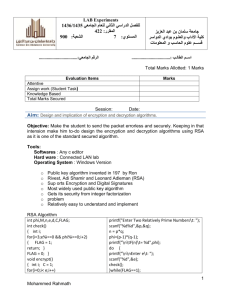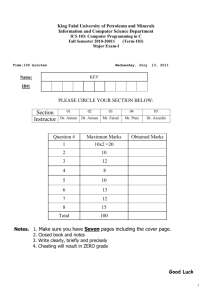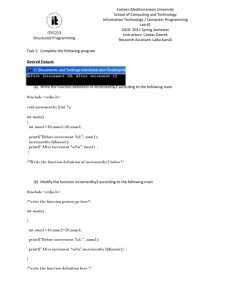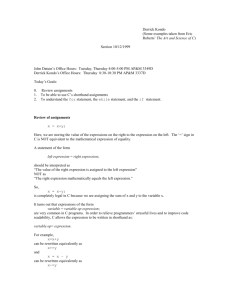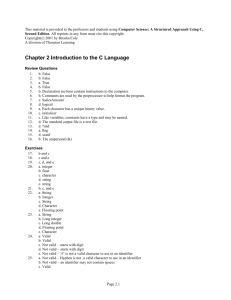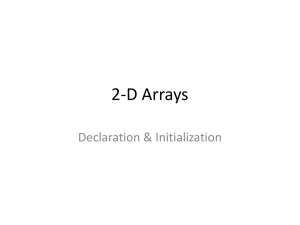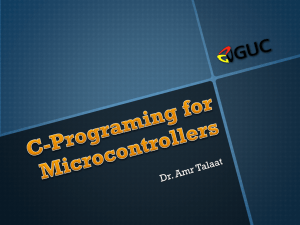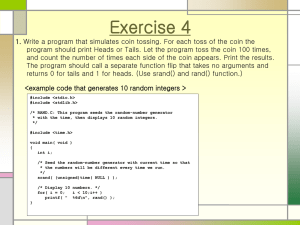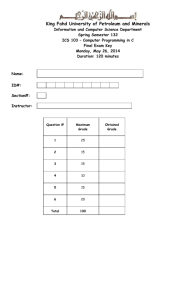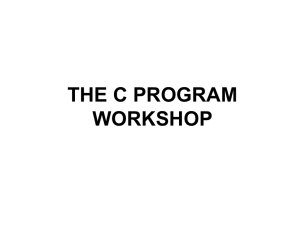/* Program to count the no of positive and negative numbers*/
advertisement
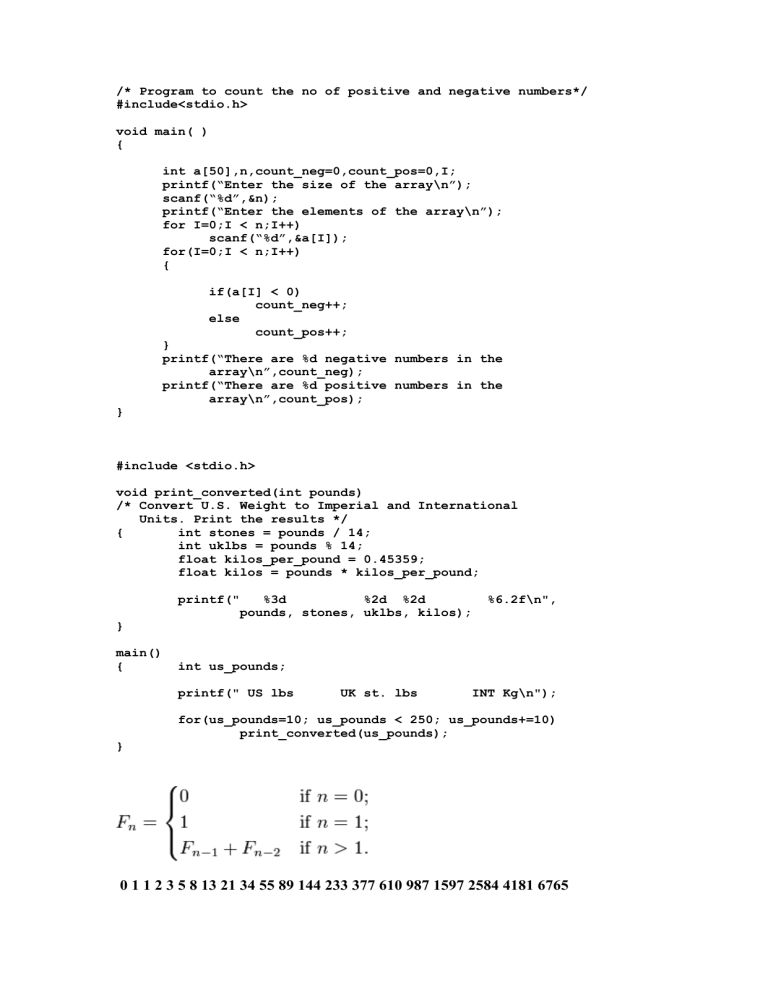
/* Program to count the no of positive and negative numbers*/
#include<stdio.h>
void main( )
{
int a[50],n,count_neg=0,count_pos=0,I;
printf(“Enter the size of the array\n”);
scanf(“%d”,&n);
printf(“Enter the elements of the array\n”);
for I=0;I < n;I++)
scanf(“%d”,&a[I]);
for(I=0;I < n;I++)
{
if(a[I] < 0)
count_neg++;
else
count_pos++;
}
printf(“There are %d negative numbers in the
array\n”,count_neg);
printf(“There are %d positive numbers in the
array\n”,count_pos);
}
#include <stdio.h>
void print_converted(int pounds)
/* Convert U.S. Weight to Imperial and International
Units. Print the results */
{
int stones = pounds / 14;
int uklbs = pounds % 14;
float kilos_per_pound = 0.45359;
float kilos = pounds * kilos_per_pound;
printf("
%3d
%2d %2d
pounds, stones, uklbs, kilos);
%6.2f\n",
}
main()
{
int us_pounds;
printf(" US lbs
UK st. lbs
INT Kg\n");
for(us_pounds=10; us_pounds < 250; us_pounds+=10)
print_converted(us_pounds);
}
0 1 1 2 3 5 8 13 21 34 55 89 144 233 377 610 987 1597 2584 4181 6765
Ian Stewart, “Life’s other secret”, Wiley 1999
#include <stdio.h>
main()
{
int fib[24];
int i;
fib[0] = 0;
fib[1] = 1;
for(i = 2; i < 24; i++)
fib[i] = fib[i-1] + fib[i-2];
for (i = 0; i < 24; i++)
printf("%3d
%6d\n", i, fib[i]);
}
BUILT IN FUNCTIONS FOR CHARACTER HANDLING
The following character handling functions are defined in ctype.h
isalnum
isalpha
isascii
iscntrl
isdigit
isgraph
islower
isprint
ispunct
Tests
Tests
Tests
Tests
Tests
Tests
Tests
Tests
Tests
for
for
for
for
for
for
for
for
for
alphanumeric character
alphabetic character
ASCII character
control character
0 to 9
printable character
lowercase
printable character
punctuation character
isspace
isupper
isxdigit
toascii
tolower
toupper
Tests for space character
Tests for uppercase character
Tests for hexadecimal
Converts character to ascii code
Converts character to lowercase
Converts character to uppercase
/* addn.c -- Read a positive number N. Then read N integers and
*
print them out together with their sum.
*/
#include <stdio.h>
int main(void)
int n;
int sum;
int current;
int lcv;
{
/*
/*
/*
/*
The number of numbers to be read
The sum of numbers already read
The number just read
Loop control variable, it counts
of numbers already read */
*/
*/
*/
the number
printf("Enter a positive number n > ");
scanf("%d",&n); /* We should check that n is really positive*/
sum = 0;
for (lcv=0; lcv < n; lcv++) {
printf("\nEnter an integer > ");
scanf("%d",&current);
/*
printf("\nThe number was %d\n", current); */
sum = sum + current;
}
printf("The sum is %d\n", sum);
return 0;
}
/* prime1.c
*
of N.
*/
It prompts the user to enter an integer N. It prints out
if it is a prime or not. If not, it prints out a factor
#include <stdio.h>
int main(void) {
int n;
int i;
int flag;
printf("Enter value
scanf("%d", &n);
flag = 1;
for (i=2; (i<(n/2))
values
if ((n % i) == 0)
flag = 0;
else
i++;
}
of N > ");
&& flag; ) { /* May be we do not need to test
of i greater than the square root of n? */
/* If true n is divisible by i */
if (flag)
printf("%d is prime\n", n);
else
printf("%d has %d as a factor\n", n, i);
return 0;
}
/* line.c -- It reads lines from input and echoes them back.
*/
#include <stdio.h>
int main(void) {
char c;
int count;
for(;;){
count=0;
printf("Please enter a line [blank line to terminate]> ");
do{
c=getchar();
putchar(c);
count++;
}while (c!='\n');
if(count==1)break;
}
}
